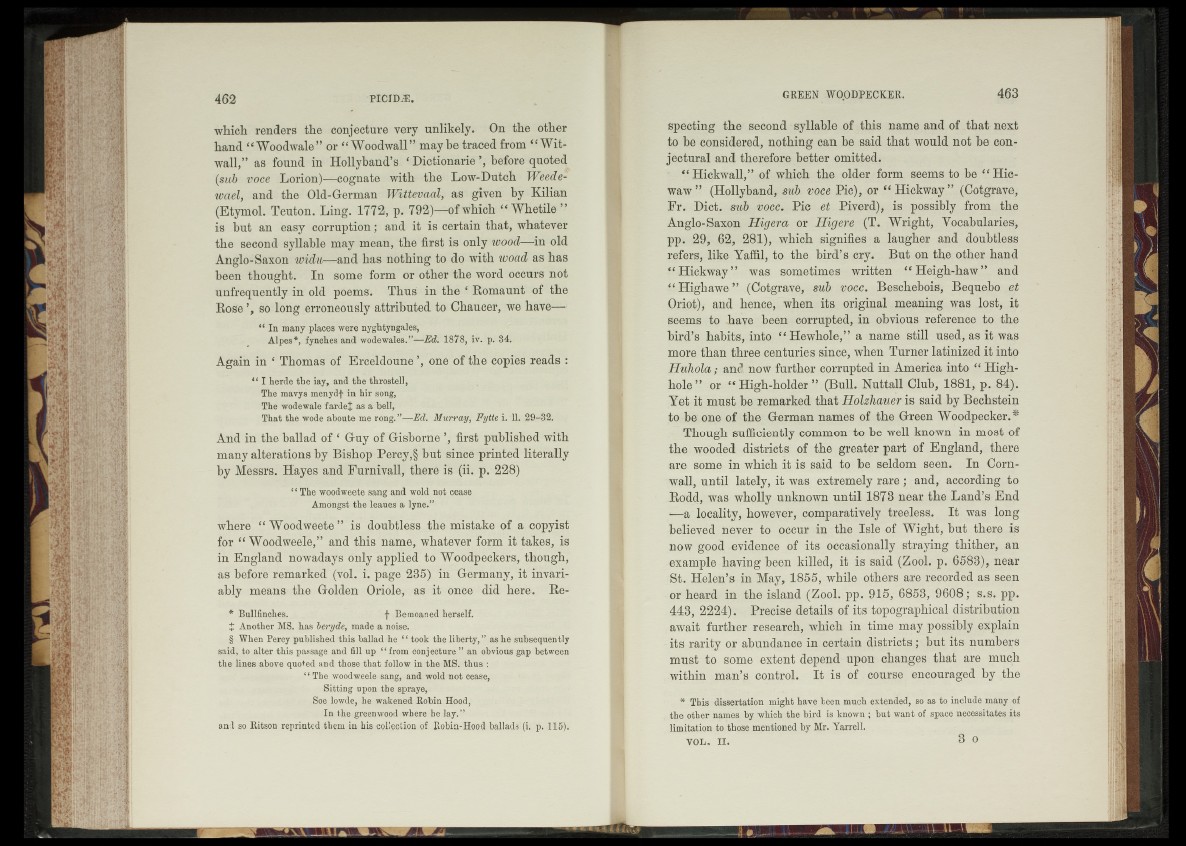
which renders the conjecture very unlikely. On the other
hand “ Woodwale” or “Woodwall” maybe traced from “ Wit-
wall,” as found in Hollyband’s * Dictionarie ’, before quoted
(sub voce Lorion)—cognate with the Low-Dutch Weede-
wael, and the Old-German Wittevaal, as given by Kilian
(Etymol. Teuton. Ling. 1772, p. 792)—of which “ Whetile”
is hut an easy corruption; and it is certain that, whatever
the second syllable may mean, the first is only wood—in old
Anglo-Saxon widu—and has nothing to do with woad as has
been thought. In some form or other the word occurs not
unfrequently in old poems. Thus in the fl Romaunt of the
Rose so long erroneously attributed to Chaucer, we have—
“ In m an y p la c e s w ere n y ghtyn g ales,
A lp e s * , fyn ch e s and w o d ew a le s .”— Ed. 1 8 7 8 , iv . p. 34.
Again in ‘ Thomas of Erceldoune ’, one of the copies reads :
“ I herd e tb e ia y , and th e th ro ste ll,
The ma v y s m en y d f in h ir song,
T h e w odewa le f a r d e j a s a b e ll,
T h a t th e wode ab oute me rong. ”— Ed. Murray, Fytte i. 11. 2 9 - 3 2 .
And in the ballad of ‘ Guy of Gisborne ’, first published with
many alterations by Bishop Percy,§ but since printed literally
by Messrs. Hayes and Furnivall, there is (ii. p. 228)
“ The w o odw ee te sang and w o ld no t cease
Am on g st th e le a u e s a ly n e .”
where “ Woodweete ” is doubtless the mistake of a copyist
for “ Woodweele,” and this name, whatever form it takes, is
in England nowadays only applied to Woodpeckers, though,
as before remarked (vol. i. page 285) in Germany, it invariably
means the Golden Oriole, as it once did here. Re-
* B u llfinche s. f Bem o an ed herself.
X A n o th e r MS. h a s beryde, made a noise.
§ When Percy p u b lish ed th is b a llad h e “ to ok th e lib e r ty ,” as h e sub seq u en tly
sa id , to a lte r th is passage an d fill up “ from conjectu re ” an obvious gap b etw een
th e lin e s ab ove q uoted and th o se th a t fo llow in th e MS. th u s :
“ The w o odw ee le sang , and wold n o t cease,
S ittin g upon th e spraye,
Soe lowde, he w akened E ob in Hood,
In th e greenwood where he la y .”
and so E itson reprinted them in h is co llection of E ob in -H o od b a llads (i. p . 1 1 5 ).
specting the second syllable of this name and of that next
to be considered, nothing can be said that would not be conjectural
and therefore better omitted.
“ Hickwall,” of which the older form seems to be “ Hic-
waw ” (Hollyband, sub voce Pic), or “ Hickway ” (Cotgrave,
Fr. Diet, sub vocc. Pic et Piverd), is possibly from the
Anglo-Saxon Higera or Higere (T. Wright, Vocabularies,
pp. 29, 62, 281), which signifies a laugher and doubtless
refers, like Yaffil, to the bird’s cry. But on the other hand
“ Hickway” was sometimes written “ Heigh-haw” and
“ Highawe” (Cotgrave, sub vocc. Beschebois, Bequebo et
Oriot), and hence, when its original meaning was lost, it
seems to have been corrupted, in obvious reference to the
bird’s habits, into “ Hewhole,” a name still used, as it was
more than three centuries since, when Turner latinized it into
Huhola; and now further corrupted in America into “ High-
hole” or “ High-holder” (Bull. Nuttall Club, 1881, p. 84).
Yet it must be remarked that Holzhauer is said by Bechstein
to be one of the German names of the Green Woodpecker.*
Though sufficiently common to be well known in most of
the wooded districts of the greater part of England, there
are some in which it is said to be seldom seen. In Cornwall,
until lately, it was extremely rare ; and, according to
Rodd, was wholly unknown until 1878 near the Land’s End
—a locality, however, comparatively treeless. It was long
believed never to occur in the Isle of Wight, but there is
now good evidence of its occasionally straying thither, an
example having been killed, it is said (Zool. p. 6583), near
St. Helen’s in May, 1855, while others are recorded as seen
or heard in the island (Zool. pp. 915, 6853, 9608; s.s. pp.
443, 2224). Precise details of its topographical distribution
await further research, which in time may possibly explain
its rarity or abundance in certain districts; but its numbers
must to some extent depend upon changes that are much
within man’s control. It is of course encouraged by the
* T h is d isse r ta tion m igh t h a v e b een m uch ex ten d ed , so as to in c lu d e man y of
th e o th e r names b y which th e bird is k now n ; h u t w an t o f space n e c e ss ita te s its
lim ita tio n to th o se m en tion ed b y Mr. Yarrell.
VO L , I I . 3 o